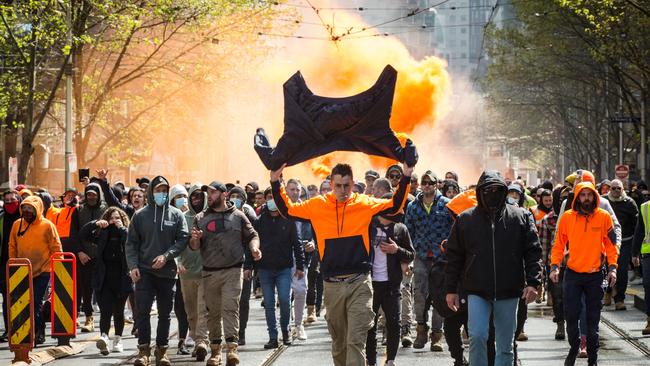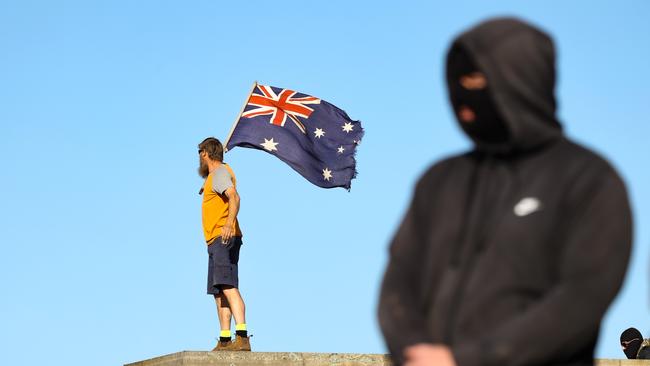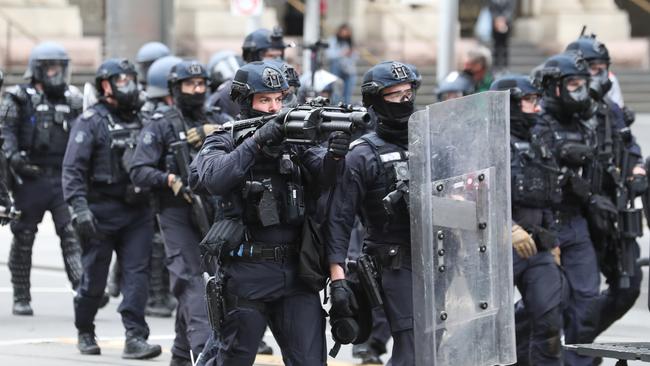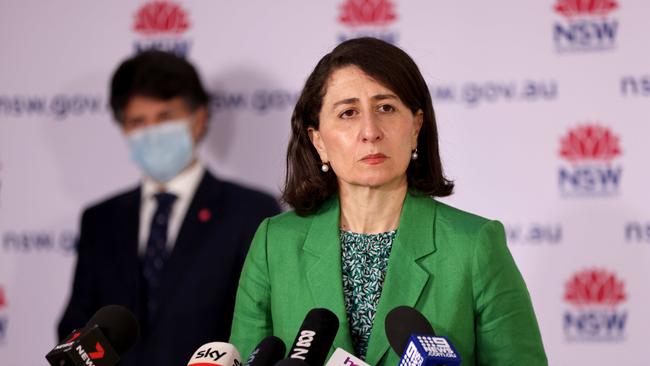Stark realities of a two tier society: how should anti-vaxxers be treated?
As protests and attacks on vax hubs in Melbourne show, many of the one in 10 among us do not intend to accept their bleak future quietly.

The violent street protests in Melbourne this week have exposed the stark tensions of the two-tier society Australia is creating between the vaccinated and the unvaccinated.
The ugly scenes have forced us to confront the same question the rest of the world is grappling with: how should anti-vaxxers be treated as countries try to vaccinate their way out of the Covid-19 pandemic?
Although the Melbourne protesters included many other groups beyond anti-vax construction workers, they were sparked by anger that getting vaccinated should be a condition of doing your job.
The fury of those protesting anti-vaxxers no doubt was fuelled by the overwhelming evidence that the rest of the country is heading in the opposite direction.
In Victoria, as protesters roamed the streets, La Trobe and Monash universities mandated that all students and staff be vaccinated against Covid-19, while the state government mandated that all teachers and childcare state must get the jab as a condition of employment.
Anti-vaxxers are being targeted by employers almost every day as a growing number of companies and organisations require their staff to be vaccinated to work.
These include SPC, Qantas, Telstra (for frontline staff), Crown, Racing Victoria, healthcare workers in Victoria and NSW, and federal aged-care workers.
Pubs, restaurants and hospitality venues in NSW and Victoria also are preparing to lock out unvaccinated customers as those states close in on the national road map reopening targets of a 70 per cent and 80 per cent double-vaxxed population.
So far, the public and political mood in Australia is firmly weighted in favour of rewarding the vaccinated at the expense of those who are unvaccinated by choice.
But as the protests and the attacks on several Covid-19 vaccination hubs in Melbourne showed this week, many of the one in 10 Australians who say they will not get vaccinated do not intend to accept this two-tier society quietly.
There is a risk that mandatory vaccination orders – such as that given by the Victorian government to construction workers – will have the effect of radicalising some anti-vaxxers and make them even less likely to get the jab.
Far right groups, many of which marched in the protests this week, are seeking to exploit this mood by using online sites to promote lies and conspiracies about the safety and effectiveness of Covid-19 vaccines.
Governments and businesses will have to tread carefully. The Victorian government’s blanket edict for Covid-19 vaccinations for construction industry workers was always risky given that surveys show construction has the highest vaccination hesitancy rate of any industry at 35 per cent.

By contrast, the NSW government chose not to mandate jabs for all construction workers but instead restricted work sites with an unvaccinated worker to 50 per cent capacity.
NSW will become the first example of this two-tier society from October 11 when the state is set to hit the initial 70 per cent target. From that day the vaccinated majority will be able to visit family and friends, dine out, drink in a pub, go to a hairdresser, and attend theatre and sporting events, although with limited numbers. The unvaccinated will receive none of these freedoms.
NSW Premier Gladys Berejiklian says that even after her state passes the 80 per cent vaccination mark, anti-vaxxers cannot “let everybody else do the hard work and then turn up” for equal freedoms.
“For those of you who choose not to be vaccinated, that’s your choice, but don’t expect to do everything that vaccinated people do even when we hit 80 per cent,” she says.
Victorian Premier Daniel Andrews says the road map for his state’s path out of lockdown also will be heavily weighted towards rewarding the vaccinated, leaving anti-vaxxers out in the cold.
“There is going to be a vaccinated economy and you get to participate in that if you are vaccinated,” Andrews says.
Both Berejiklian and Andrews appear to have strong public support for rewarding the vaccinated at the expense of anti-vaxxers. Most people in Sydney and Melbourne are exhausted by their indefinite lockdowns and have little sympathy for those who remain unvaccinated by choice, especially if they delay their path to regaining freedoms.
A recent survey by YouGov found that two in three Australians support a so-called vaccine passport that people must produce to gain entry to sport venues, cinemas, nightclubs and restaurants. Only one in five people opposes such a move.
This was backed up by the Melbourne Institute’s latest findings that show 57 per cent to 68 per cent of Australians agree to excluding the unvaccinated from certain public events and activities. However, between 16 per cent and 23 per cent disagree with locking out the unvaccinated.
The Melbourne Institute found a similar proportion – 57 per cent – agree that businesses have a right to deny service to the unvaccinated, while one in four disagrees with businesses refusing service to the unvaccinated.
Anthony Scott, co-ordinator of the institute’s health program, says the realisation by many vaccine-hesitant people that they soon will be locked out of restaurants, pubs, cafes, travel and possibly even their jobs is helping incentivise them to get the jab.
“A sizeable proportion of people will be influenced by that,” he tells Inquirer. “I think it is changing people’s minds when they think about what opening up might mean for them.”
Vaccine hesitancy is continuing to decline, with the institute’s latest figures showing a fall from 20.3 per cent on August 20 to 16.7 per cent on September 12. This is down from 35.5 per cent in mid-May.
Of this 16.7 per cent, 7.3 per cent don’t know if they will eventually take the vaccine, while 9.4 per cent say they will not.

Confidential research by the federal Health Department this month and seen by The Australian shows an even sharper decline in vaccine hesitancy to just 10 per cent, with only 3 per cent saying they definitely would not get vaccinated.
Scott says even though vaccination rates are strong across the country, there always will be a hardline minority of anti-vaxxers.
“We will probably reach about 85 per cent vaccinated if we are lucky, but there will always be around 10 to 15 per cent who will be very hard to reach,” he says.
So far only a few voices, most from the right, have spoken out against vaccine passports. Coalition senators Alex Antic, Eric Abetz and Gerard Rennick have said they oppose vaccine passports and discrimination against anti-vaxxers. “I oppose vaccine passports on principle, but they are also wrong on a practical level,” Abetz says. “Vaccinated people can still contract and spread the virus.”
Liberal Democrats Senate candidate Campbell Newman claims excluding anti-vaxxers from workplaces, sporting, social and other groups will create “a very ugly Australia”.
“Before we rush headlong into a two-tiered society, with perhaps one in five Australians condemned to perpetual lockdown and excluded from many aspects of life, let’s pause and think through the practicalities,” he wrote in this newspaper.
This vaccination debate has the potential to get nastier because – unlike in other Western countries – Australia’s road map to freedom effectively pits the vaccinated directly against the anti-vaxxers.
Under the agreed national plan Covid restrictions will start to wind down substantially only once the Doherty Institute’s 70 per cent and 80 per cent targets are reached.
Now that vaccine supplies are ramping up, the only obstacle to reaching those targets in a timely way is if enough people refuse to get vaccinated. In other words, anti-vaxxers still could block or at least delay freedoms for the vaccinated majority.
Covid-19 Taskforce commander Lieutenant General John Frewen has cautioned that reaching 80 per cent for all of the states quickly will be “hard work”. He noted the overseas experience where vaccination rates have slowed at higher levels. “I’ve just been watching the overseas experience,” Frewen says. “Getting from 70 to 80 is hard work.”
Those who support vaccine passports to allow fully vaccinated people to attend restaurants, pubs and sporting events say it serves two main purposes. First, it is a powerful incentive for people to get vaccinated, especially those under 30 who are the most reluctant. Second, vaccine passports, by excluding the unvaccinated, also have the effect of reducing transmission of the virus. Because an unvaccinated person is five times likelier to spread the virus, it is logical that transmission rates in social and sporting venues, as well as workplaces, will be far less if the unvaccinated are excluded.
Supporters say requiring a Covid-19 vaccination passport is no less of an infringement on civil liberties as is wearing a seatbelt or a bike helmet or current requirements that young children get various vaccinations as a condition of going to school.
But the logistics of creating this two-tier world are complex, expensive and far from foolproof.
In NSW, the 70 per cent reopening moment will arrive before it has a centralised statewide system in place to verify a person’s vaccination status.
Other states also are scrambling to devise ways to check easily who has been jabbed and who has not.

Many small businesses have little guidance about how this two-tier system will work. How will they physically keep out the unvaccinated if those people choose to ignore the rules? Will they have to hire security at their own cost?
Retail billionaire Solomon Lew this week angered shopping centre owners by proposing vaccine and temperature checks at all mall entrances.
Restaurant and Catering Australia chief executive Wes Lambert says a new set of public health orders is needed to give businesses certainty around the rules of the vaccine passport system.
“The hospitality industry needs the public health orders to be released as a matter of urgency so that businesses understand the mechanisms and the requirements around the QR code and the sighting of vaccination certificates,” he says.
Scott Morrison is wary of the term vaccine passport given the opposition to it within right-wing Coalition ranks. But he accepts that the concept will play a key role in lifting vaccination rates and reopening the economy.
“Any venue, any pub, any cafe, any restaurant, any shop can, has every right under Australia’s property laws to be able to deny entry to people who are unvaccinated,” he said earlier this month.
The treatment of anti-vaxxers overseas offers mixed lessons for Australia.
In France, rules introduced in July requiring proof of vaccination to get into cafes, restaurants, museums, trains and planes triggered a surge in vaccinations, especially among the young, that health officials say have “saved tens of thousands of lives”.
Italians have backed a similar “green pass” system introduced last month, while Austria, Belgium, Germany, Hungary, Ireland, The Netherlands, Portugal, several Canadian provinces, Scotland and New York City are among those that have introduced some form of vaccine pass.
US President Joe Biden this month lost patience with the high rate of unvaccinated Americans and mandated that most federal workers get the jab. Across the country about half of US states – almost all Democrat – have introduced various forms of vaccine mandates for government workers and contractors.
But support for vaccine mandates and vaccine passports has not been universal.
England this month abruptly dropped its plans for an official vaccine passport, with members of Boris Johnson’s Conservative party calling it a hindrance to business and an infringement of civil liberties.
“I’ve never liked the idea of saying you must show your papers or something to do what is just an everyday activity,” British Health Secretary Sajid Javid says. However, he says the government “should keep it in reserve as a potential option” if the virus surges again. Many English pubs and restaurants have taken it on themselves to require proof of vaccination as a condition of entry.
But Australia’s new two-tier vaccination society is almost certainly going to be a temporary one. The costs on businesses and governments of enforcing the rules indefinitely would be exorbitant.
And when vaccination rates clearly have stalled and the virus is largely at bay, the unvaccinated at some point will have to be reintegrated into mainstream life. This month Denmark dropped its vaccine passport, saying it was no longer necessary because the country was 75 per cent fully vaccinated.
Australia is just beginning its two-tier vaccination pathway out of the pandemic. It got off to a rocky start this week in Melbourne but, despite the optics of the violent protests, the national mood clearly is to reward the vaccinated as soon as possible. This will leave anti-vaxxers on the sidelines and facing a bleak future in the months ahead.


To join the conversation, please log in. Don't have an account? Register
Join the conversation, you are commenting as Logout